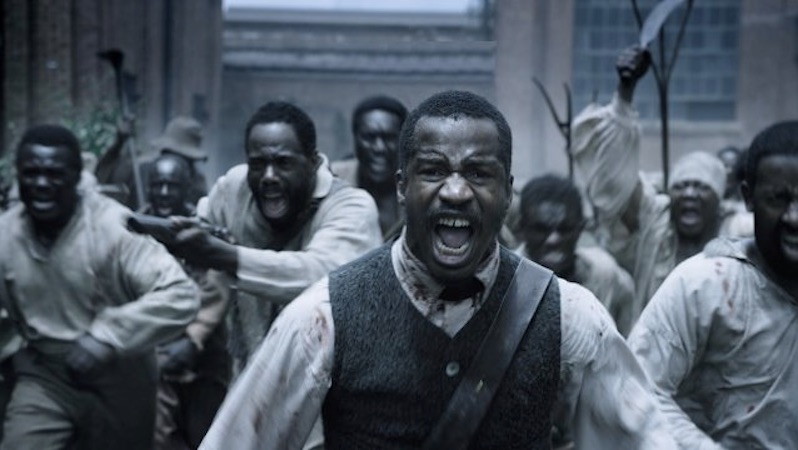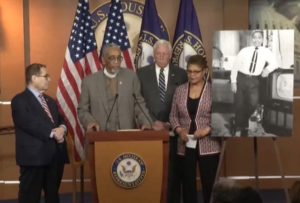Los Angeles Film Festival Reframes African-American Struggle With Two Empowering Films
In this era of submissive-slave characters, black tokenism and underrepresentation of people of color in Hollywood, "The House on Coco Road" and the 2016 version of "The Birth of a Nation" flip the script. Still image from Nate Parker's "The Birth of a Nation." (IMDb)
Still image from Nate Parker's "The Birth of a Nation." (IMDb)
Still image from Nate Parker’s “The Birth of a Nation.” (IMDb)
On June 1, Film Independent’s Los Angeles Film Festival opened and introduced two films with empowering storylines featuring African-Americans. In our era of submissive-slave characters, black tokenism and underrepresentation of people of color on screen and in Hollywood, it is a major feat.
One of the two films was Nate Parker’s “The Birth of a Nation,” which opens nationwide on Oct. 4. The film portrays the life of Nat Turner, the iconic leader of an 1831 slave rebellion in Virginia.
The film has the same title as D.W. Griffith’s 1915 silent drama, known for its glorification of the Ku Klux Klan and white supremacy.
“I wanted to take this and tame it and repurpose it and give it to Nat Turner,” Parker told the audience at a panel discussion at the festival. “Never has there been a film that was a true story, where we fought against our oppressor in a way that shone light on our ability to stand for ourselves.”
Parker produced, wrote, directed and starred in the film, and he is now working on a studio album—with “today’s top artists,” he says—to reach youths who might not initially be interested in Nat Turner’s story. “If this film doesn’t reach the kid on the block in Bed-Stuy, I’ve failed,” Parker said.
Actor Gabrielle Union, who has a cameo in the film, also participated in the discussion and highlighted the film’s relevance to issues plaguing African-Americans today.
“It’s so timely, right? That as ‘Roots’ is premiering, there’s a fierce debate about the questionable killing of a gorilla,” Union told the audience. “So much of our society can see the humanity of an animal. That animal did not deserve to die, not on that day. But we still are demonizing a 12-year-old boy shot within seconds for the sin of being a child in an open-carry state … but we can’t see that child’s humanity.”
The plight of African-American filmmakers, actors and others in Hollywood who are striving for equal recognition is only a fraction of the hardship faced by African-Americans as a whole.
According to Michelle Alexander, author of “The New Jim Crow: Mass Incarceration in the Age of Colorblindness,” more African-Americans are incarcerated, on parole or on probation in 2016 than were enslaved in 1850, two decades after Nat Turner led his rebellion.
Three out of four African-Americans are expected to serve time in prison, according to Alexander. Poverty rates have skyrocketed since 2000, family wealth has plummeted in the last 25 years, underemployment and unemployment rates are disproportionately low, and drugs and crime fill the streets of many African-American communities across the country. Initiatives like the “war on drugs” and tough-on-crime drug sentencing have unfairly targeted African-American communities and increased crime and drug-arrest quotas in the areas where African-Americans live.
Manipulation and loopholes have enabled discrimination in the courts. Voting registration has grown more difficult for people in urban areas because of increasingly limited polling times, restricted access to transportation and often intentional disenfranchisement. A recent study shows that one in 13 African-Americans have permanently lost the right to vote due to a felony conviction. Vermont and Maine—which both have mostly white populations—are the only two states that allow felons to vote. Basic human rights and liberties are being stripped to prevent the advancement of African-Americans.
The theme of justice was examined in “The House on Coco Road,” another film premiering at the festival this month. Unlike “The Birth of a Nation,” “The House on Coco Road” is a documentary that follows a California family as they seek a sense of community on the Caribbean island nation of Grenada, where they had thought they could find utopia.
The story begins in the 1980s, when the family is living in Los Angeles, and Fannie Haughton—the mother of the film’s director, Damani Baker—is attending UCLA. There, Haughton becomes involved in the black liberation movement and helps in the Black Panther Party’s free breakfast program. She also is offered a teaching-assistant role with the famed African-American activist and professor Angela Davis. After Davis is terminated because of her communist views, Haughton and her family move north to Oakland, where she babysits the children of her activist friends.
In 1983, amid the Reagan administration’s war on drugs, and seeking a better life for her family, Fannie accepts a position in Grenada’s Ministry of Education and moves to a house on Coco Road.
“Anything would be better than the injustice she knew,” Baker recounts over archival footage of family videos.
But Grenada was only their home for a brief time. The same year they moved, the United States led a military invasion of the island country following the assassination of the prime minister, Maurice Bishop, and the family was forced to return to Oakland.
No peace. No belonging. Such a reality is a familiar one across the United States in 2016 to many African-Americans who face disenfranchisement and disconnection in the very nation their ancestors built with bare hands. Strangers in their own home.
Films like “The Birth of a Nation” and “The House on Coco Road” have a healing effect by helping African-Americans reclaim their roots. Audiences can discover the truth about African-American history. After years of searching for purpose and meaning, as Damani Baker’s mother does, the uplifting ancestral art that these films represent has the power to change the African-American narrative—for good.
Photos and audio by Sarah Wesley (via Evrybit):
Your support matters…Independent journalism is under threat and overshadowed by heavily funded mainstream media.
You can help level the playing field. Become a member.
Your tax-deductible contribution keeps us digging beneath the headlines to give you thought-provoking, investigative reporting and analysis that unearths what's really happening- without compromise.
Give today to support our courageous, independent journalists.






You need to be a supporter to comment.
There are currently no responses to this article.
Be the first to respond.